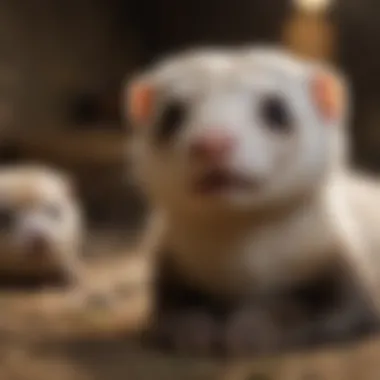Where to Find a Ferret: Breeders, Rescues, and More


Intro
Acquiring a ferret goes beyond merely selecting a cute animal. It requires careful consideration of several key factors, including the source from which the pet is obtained, the responsibilities of ownership, and legal implications. This article will guide potential ferret owners through various avenues for getting a ferret, encompassing reputable breeders, rescue centers, and pet stores. Moreover, this guide aims to enlighten readers about the overarching responsibilities and ethical questions that arise when integrating a ferret into a household.
Animal Overview
Ferrets have gained popularity as pets, known for their playful nature and agility. Understanding their background can assist when considering bringing one into your home.
Common Names
Ferrets are commonly referred to as just ferrets. However, they can also be called by their scientific name, Mustela putorius furo.
Scientific Classification
Ferrets belong to the family Mustelidae, which includes weasels, badgers, and otters. They are domesticated descendants of the European polecat, specifically bred for various traits valued by humans.
Geographic Range
While ferrets are commonly found in homes across the globe, wild relatives can be found primarily in Europe and North America. The domesticated ferret has adapted well to human environments, making them readily available in various localities.
Behavior and Social Structure
Understanding ferret behavior is vital for potential owners. Their social structure and habits impact how they integrate within a home setting.
Social Behavior
Ferrets are naturally social creatures. They thrive in environments where they can interact with other ferrets or humans. They display playful behavior, making them engaging companions.
Communication
Ferrets communicate using a variety of sounds, including churrs and dooking. These sounds are indicative of their playful nature. Recognizing these signals can enhance the bond between ferret and owner.
Mating and Reproduction
In terms of reproduction, ferrets can breed once they reach sexual maturity at around six months. Breeders should be responsible, ensuring that pairing is done ethically and with proper health checks to avoid genetic issues.
Habitat and Ecosystem
Although ferrets are domesticated, understanding their habitat can improve care practices and enhance owner knowledge.
Natural Habitat
In the wild, ferrets inhabit fields, woodlands, and areas with plenty of cover for hunting and breeding. Their natural instinct is to burrow, which should be considered when designing a living space for them.
Food Sources and Diet
Ferrets are obligate carnivores. This means their diet must be high in protein and low in carbohydrates. A proper diet includes high-quality ferret food, including meat-based proteins and occasional whole prey items.
Role in Ecosystem
In the wild, ferrets control small mammal populations, contributing to the ecological balance. However, as pets, this role shifts primarily to companionship. Understanding their natural instincts can aid in providing a fulfilling captive environment.
Prelims to Ferret Ownership
Owning a ferret can be a rewarding experience, yet it also demands significant understanding and preparation. This section outlines the key aspects of ferret ownership, ensuring prospective owners appreciate the responsibilities involved. Understanding what it means to care for a ferret is fundamental. Ferrets are lively animals that possess unique needs, and recognizing these from the outset can help foster a better owner-pet relationship.
Understanding Ferrets as Pets
Ferrets are not your typical household pets. They thrive on interaction and engage their owners with playful behavior. These small, energetic creatures belong to the weasel family and can weigh anywhere from 1-3 pounds. They often exhibit curiosity and intelligence that can make them quite entertaining to observe. However, ferrets also require care and attention. Their diet needs to be balanced, focusing primarily on high-quality protein sources. Additionally, ferrets need socialization to prevent behavioral issues, making it important for owners to dedicate time to play and interaction. Understanding their nature will lead to a happier and healthier relationship.


Brief Overview of Ferret Characteristics
Ferrets have distinct characteristics that set them apart from other pets. They have a slender body, a long tail, and a unique set of vocalizations that can catch an owner's attention. Their fur can come in a variety of colors and patterns, further emphasizing their uniqueness. Ferrets are naturally inquisitive, often getting themselves into curious situations, which can be both charming and challenging.
Some important traits to consider are:
- Social Animals: Ferrets enjoy being around others, whether it’s other ferrets or their human companions.
- High Energy: They require daily exercise and mental stimulation to stay happy.
- Sleep Patterns: Ferrets are crepuscular, meaning they are most active during dawn and dusk, which can affect the owner's schedule.
Understanding these characteristics enhances the potential owner’s ability to meet the needs of a ferret. Proper knowledge ensures a more enjoyable experience and fosters a loving environment, creating a bond that both the owner and ferret will cherish.
Exploring Ethical Sources
Acquiring a ferret should always be approached with mindfullness. Understanding where to obtain a ferret ethically is crucial. This process ensures that potential owners support responsible breeding practices and promote the welfare of these animals. Ethical sources reduce the risk of contributing to problems like overpopulation and commercialized breeding, which often neglect the well-being of animals.
Reputable Breeders
How to Identify a Responsible Breeder
Selecting a responsible breeder is vital. A reputable breeder prioritizes the health and temperament of their ferrets. A key characteristic of such breeders is their commitment to breeding standards set by ferret organizations. This commitment ensures that you get a healthy pet, which is important for both their welfare and your experience as an owner.
Look for breeders who allow visits to their facilities. This transparency indicates trust and responsibility. Additionally, a good breeder should provide a health guarantee for their ferrets. Such features highlight the advantages of choosing reputable breeders over less scrupulous sources.
Questions to Ask the Breeder
Asking the right questions plays a vital role in understanding a breeder’s practices. Focus on their knowledge about ferret care and their breeding processes. A respected breeder should hold detailed knowledge of health screenings and genetic testing.
Key questions include:
- What health tests have the parents undergone?
- Can you provide references from previous customers?
- What is the socialization process for the ferrets?
These inquiries can reveal the breeder’s level of commitment to the animals. Moreover, this dialogue offers insight into the overall breeding environment and practices.
Animal Shelters and Rescue Centers
Benefits of Adopting from Shelters
Adopting a ferret from an animal shelter has multiple benefits. Rescues often have ferrets in need of homes, which alleviates the burden on shelters. Choosing to adopt promotes a positive impact on the community and reduces the number of animals in shelters. Moreover, you usually pay a lower adoption fee compared to purchasing from breeders.
Another benefit is that rescue centers often have staff knowledgeable about ferret behavior. They can guide you toward a ferret that fits your lifestyle, enhancing the potential for a successful pet-owner relationship.
How to Find Local Rescue Centers
Finding local rescue centers requires some research. Begin by searching online platforms, where sites like Facebook and Reddit frequently list nearby shelters. Websites of national and local animal advocacy groups often provide directories of rescues.
Also, consider reaching out to local veterinarians. They can refer potential adopters to nearby rescue organizations. Building relationships with animal lovers in your community can further enhance your search efforts.
Pet Stores: Pros and Cons
Identifying Ethical Pet Stores
Some pet stores can be ethical sources of ferrets, but it is essential to know how to identify them. Ethical pet stores source their animals from responsible breeders and prioritize animal welfare. A major characteristic of such stores is their commitment to educating customers about care requirements. They should also provide clear information about the lineage and health of the animals available for purchase.
Looking for stores that work with local rescue organizations can also be helpful. These stores often promote adoption events and may even have rescue ferrets for sale at a lower price.
Potential Issues with Store-bought Ferrets
Potential issues arise when purchasing ferrets from pet stores. Many high-volume stores often neglect the individual care of their animals. This neglect can lead to health problems. In addition, these ferrets might not have been socialized properly, affecting their behavior in a home setting.
Owners must weigh the pros and cons before deciding. If you choose to buy from a pet store, ensure you are comfortable with the store’s practices and the welfare of their animals.


Legal Considerations
Understanding the legal landscape surrounding ferret ownership is crucial for those considering bringing a ferret into their home. Laws vary significantly across regions, and being informed is key to ensuring that you abide by local regulations. This section focuses on the importance of recognizing the legal parameters, including ownership laws and related requirements. Not only does this knowledge minimize risks, but it also promotes responsible pet ownership.
Understanding Local Laws
States Where Ferrets are Legal
In the United States, the legality of ferret ownership differs by state. Some states allow ferrets as pets while others have strict regulations or outright bans. For instance, states like California and Hawaii do not permit ferret ownership due to concerns about wildlife viability. Meanwhile, states such as Pennsylvania and Michigan embrace ferrets as popular companions.
An important aspect of knowing laws about ferrets is the ability to navigate potential issues before they arise. Areas with legal ferret ownership often have a supportive community of ferret enthusiasts, making it easier for new owners to find resources. However, it is essential to pay attention to the local statutes, as they can change frequently, and failure to comply may result in fines or confiscation of the animal.
Licensing and Registration Requirements
In certain areas where ferret ownership is permitted, licensing and registration requirements may be in place. These regulations help ensure that owners are knowledgeable about the care needs of ferrets. They may also include a requirement for a health check or proof of vaccinations. While some might view these requirements as an inconvenience, they fundamentally serve the larger goal of promoting responsible ferret care and enhancing animal welfare.
The requirement to register ferrets can also create a framework for accountability among pet owners. Registration ensures that authorities can monitor ferret populations and manage any related issues, such as potential overbreeding or abandonment. Yet, these regulations can also have downsides, including additional costs for owners and the need for them to keep track of permits.
Import/Export Regulations
Transferring Ferrets Across Borders
If you plan to move or travel internationally with your ferret, understanding import and export regulations is paramount. These rules determine whether you can legally bring your pet into another country and what documentation is necessary. Some countries have strict restrictions or may even ban ferrets entirely due to environmental concerns. Understanding these regulations can save potential complications later.
The unique feature of these regulations is their role in protecting native wildlife. By controlling which species can be imported, countries aim to prevent invasive species from disrupting local ecosystems. However, this can also disadvantage owners who wish to travel with their pets or relocate for work.
Health Certificates and Quarantine Issues
Health certificates and quarantine regulations are pivotal when transferring ferrets across borders. Many countries require a health certificate, issued by a veterinarian, to certify that the ferret is healthy and free from diseases. Some countries may enforce a quarantine period upon arrival, which can be burdensome for travelers.
This requirement is beneficial for public health as it helps prevent the spread of disease. Nonetheless, it may create delays and stress for both the owner and pet. Understanding these processes ahead of any travel plans is vital.
It's wise to consult the specific laws and regulations for your destination well in advance to avoid any surprise issues.
By comprehending the legal considerations surrounding ferret ownership, potential owners position themselves for a smoother experience. Knowledge empowers individuals to make informed choices while fostering a greater sense of responsibility towards their ferret companions.
Cost of Owning a Ferret
Understanding the cost of owning a ferret is vital for potential ferret owners to make informed choices. Ferrets are unique pets with specific needs, and being aware of these financial commitments will prepare owners for a more responsible ownership experience. This section explores various costs associated with acquiring a ferret and maintaining its care over time.
Initial Acquisition Costs
Prices from Breeders vs.
Shelters
When it comes to acquiring a ferret, the prices from breeders and shelters can differ significantly. Typically, ferrets from breeders range from $100 to $300, depending on the ferret's lineage and the breeder's reputation. On the other hand, adopting from a shelter usually costs less, often around $50 to $100.
Choosing to adopt from a shelter can be a moral and economic choice. Shelter ferrets often are in need of a home, and adopting one can be viewed as a responsible action. Conversely, breeders may offer ferrets with known health histories. This factor may appeal to owners looking for specific traits or guarantees.
Additional Expenses to Consider
Beyond the initial cost of acquisition, potential ferret owners should factor in the additional expenses that accompany pet ownership. These can vary but generally include essentials like housing, food, and supplies.
For instance, a proper ferret cage can cost between $150 and $300, depending on size and features. Nutritional food items also add to ongoing expenses, generally costing about $20 to $30 per month. Care must also include items like litter, toys, and hygiene products that can further increase monthly spending. Planning these costs ensures owners are well-prepared beyond just the acquisition phase.
Long-term Care Expenses
Food, Housing, and Veterinary Care


The ongoing cost of food, housing, and veterinary care forms a significant portion of the overall expenses associated with owning a ferret. Ferrets require specific diets, which may include high-quality ferret food or specialized raw diets. This necessity translates to recurring monthly costs. Veterinarian visits can also be expensive, especially if specialized care is needed, as ferrets are prone to certain health issues.
Regular check-ups, vaccinations, and emergency care should be included in the budgeting plan. Setting aside funds for these health-related issues ensures owners can provide proper attention to their pets' needs.
Unexpected Costs Associated with Ferret Care
The highlight of unexpected costs is crucial when considering ferret ownership. Ferrets can experience health problems that may arise suddenly. These health issues may require costly treatments or emergency vet visits that are not planned for in the regular budget.
Additionally, accidents around the home may necessitate replacing items, such as furniture that a ferret has damaged during play or exploration. Anticipating potential unexpected costs is important to provide a comprehensive approach to managing ferret-related finances.
In summary, being informed about the costs associated with owning a ferret is essential for responsible ownership and ensuring the well-being of these curious animals.
Post-Acquisition Guidance
Understanding what comes after acquiring a ferret is crucial for effective ownership. This section outlines how to properly set up for a new pet and what responsibilities lie ahead. Being prepared is not just about having the right supplies; it's also about understanding the needs of ferrets, both physically and emotionally. A well-prepared environment and informed owner can contribute significantly to the well-being of your new pet.
Preparing Your Living Space
Setting up where your ferret will live is the first part of post-acquisition guidance. This involves providing an adequate living space and making sure it meets their needs.
Essential Supplies and Equipment
One of the main elements for preparing your ferret's living space is acquiring the right supplies. Ferrets need a cage that offers enough room for them to move and play. The key characteristic of the right cage is its size; it should be spacious and multi-level. Some ferret cages come equipped with hammocks and ramps, allowing for enrichment in their environment.
The unique feature of good quality ferret cages is the ease of cleaning, which is critical due to their playful and sometimes messy behavior. Simpler cleaning leads to a healthier habitat and it's much easier for the owner. However, there can be disadvantages, like the higher cost associated with top-tier cages.
Creating a Safe Environment
Creating a secure environment is just as important as having the right supplies. Ferrets are curious creatures, often getting into places they shouldn't. The key characteristic of a safe environment is providing both supervised playtime and secure spaces when you are unavailable.
To ensure safety, unique features can include securing electrical cords and removing small objects that pose choking hazards. Another aspect involves using ferret-proof gates if you need to restrict their movement in your home. The dangers of an unsafe environment far outweigh the complexities of safety precautions, making this a beneficial aspect of ferret ownership.
Responsibilities of Ferret Ownership
Ownership comes with its own set of responsibilities. Knowing what's expected helps ensure a smooth transition into a ferret-friendly lifestyle.
Routine Care and Socialization Needs
Regular care and socialization are vital. Ferrets require daily attention and interaction. Their social nature means that they thrive in engaging environments, which directly contributes to their happiness and health. A key characteristic of ferret routines involves the need for at least two hours of playtime outside of their cage each day.
Unique aspects, such as litter training and positive reinforcement, can make routine care practical. However, neglecting their social needs can lead to behavioral problems, which is an important consideration.
Understanding Behavioral Traits
Grasping the behavioral traits of ferrets is another essential part of ownership. Ferrets are known for their playful and curious behavior, characteristics that not only define them but also affect how they interact with their environment. Understanding these traits contributes to a more harmonious relationship between the pet and owner.
Unique features of ferret behavior include their tendency to burrow and hide. This may require owners to provide hiding spots that are safe and engaging. However, knowing these traits will assist in managing any potential issues, like digging through inappropriate areas. Understanding their behavior leads to informed decisions that further improve the quality of life.
In summary, preparing your living space and understanding the responsibilities of care are paramount after acquiring a ferret. Knowledge is your ally in ensuring a fulfilling relationship with your new pet.
Finale
In summary, the decision to welcome a ferret into your home comes with multiple layers of consideration. This article outlined various avenues to acquire a ferret, including reputable breeders, animal shelters, and pet stores. Each source presents unique advantages and challenges that potential owners must weigh.
Recap of Key Considerations
- Source Evaluation: Choosing where to get a ferret is critical. Reputable breeders often provide healthy and well-socialized animals, but rescue centers offer a chance to give a second life to a pet in need. Pet stores may be convenient but come with concerns about ethical sourcing.
- Legal Aspects: Understanding the legality of owning ferrets in your location is vital. Some states have restrictions, and compliance with local laws is non-negotiable.
- Cost Factors: The financial responsibility extends beyond acquisition. Initial costs from breeders might be higher than shelters, but long-term care requires budgeting for food, veterinary services, and supplies.
- Responsibility: Ownership is a long-term commitment. A ferret requires a specific environment, regular care, and social interaction. Prospective owners should consider their ability to provide this
Making an Informed Decision
Ultimately, the choice of where to acquire a ferret should be aligned with personal values and circumstances. It is essential to
- Conduct thorough research into breeders and shelters.
- Prepare for the long-term responsibilities that ferret ownership entails, including understanding their behaviors and needs.
- Consider the ethical implications that accompany each option available.
Ferrets can be delightful companions, and making an informed decision ensures that both the owner and the ferret thrive in their new relationship.







